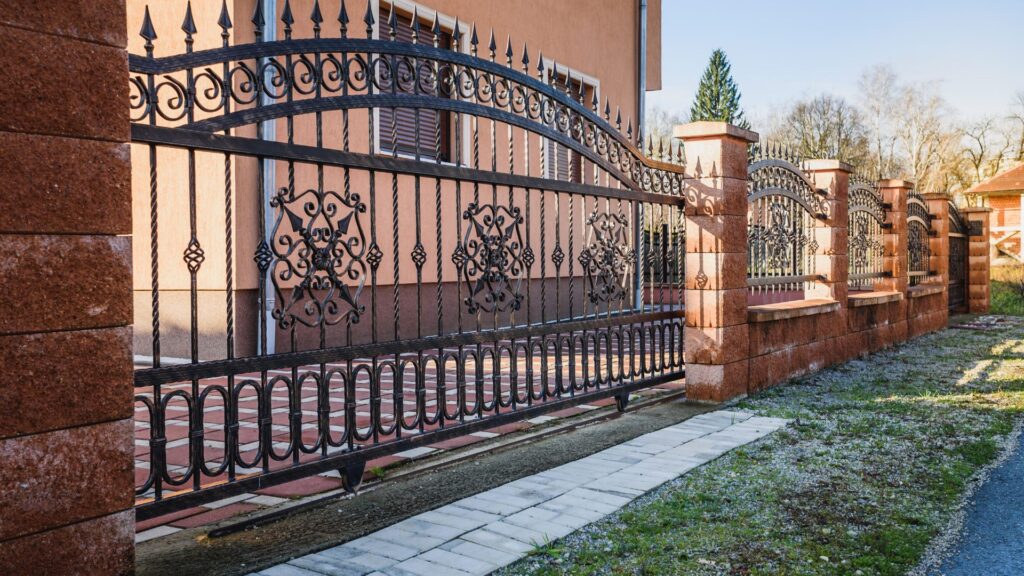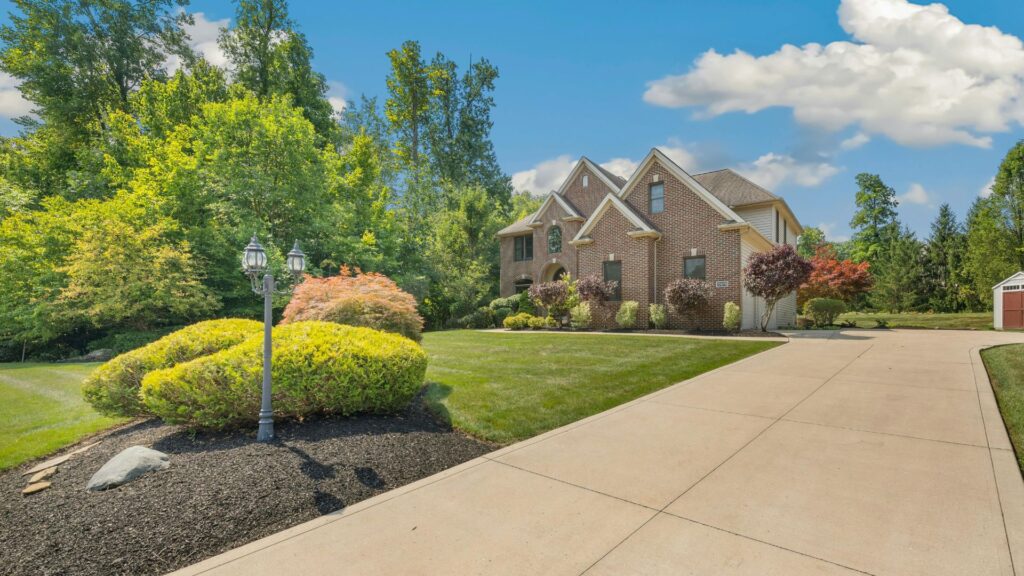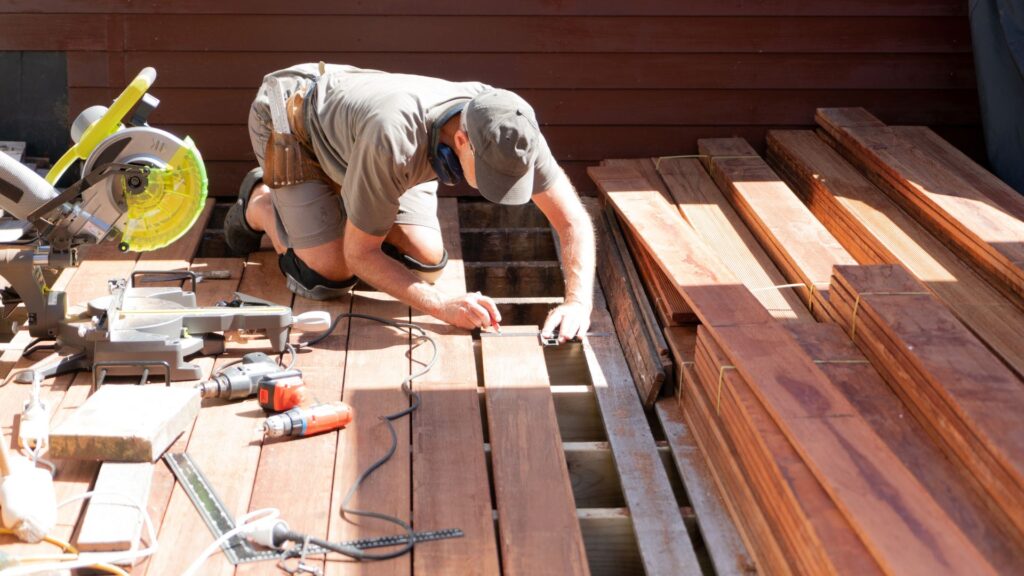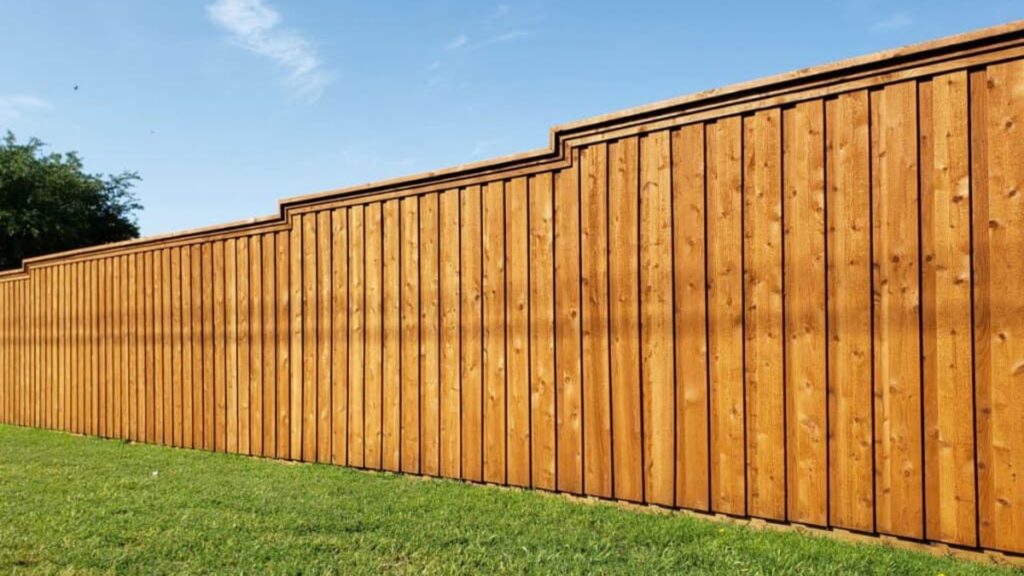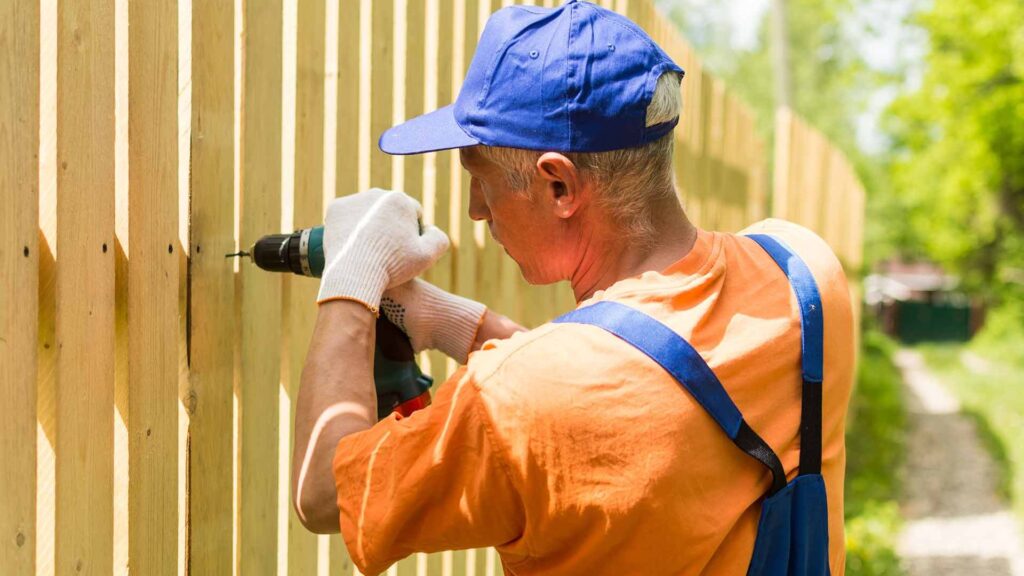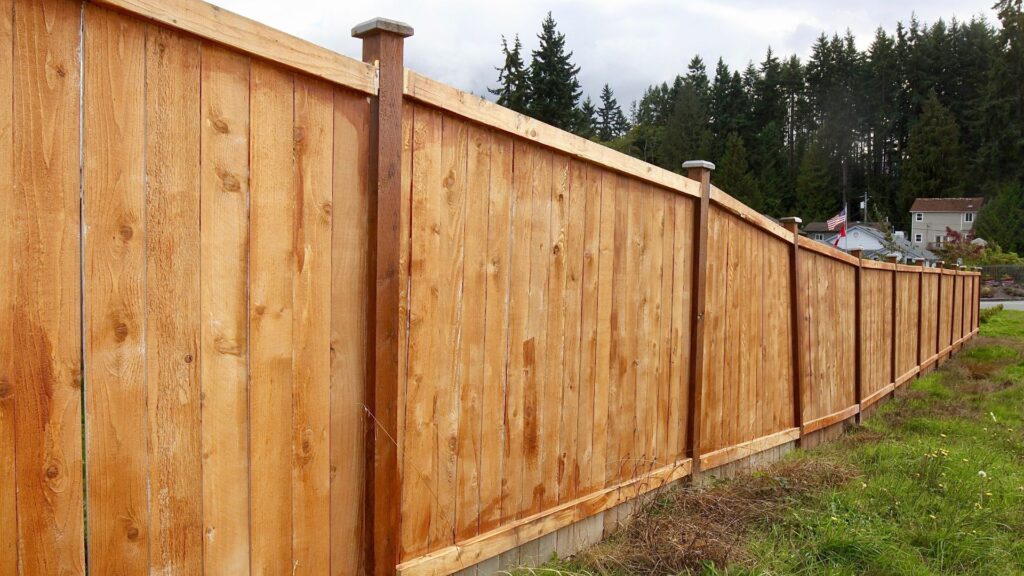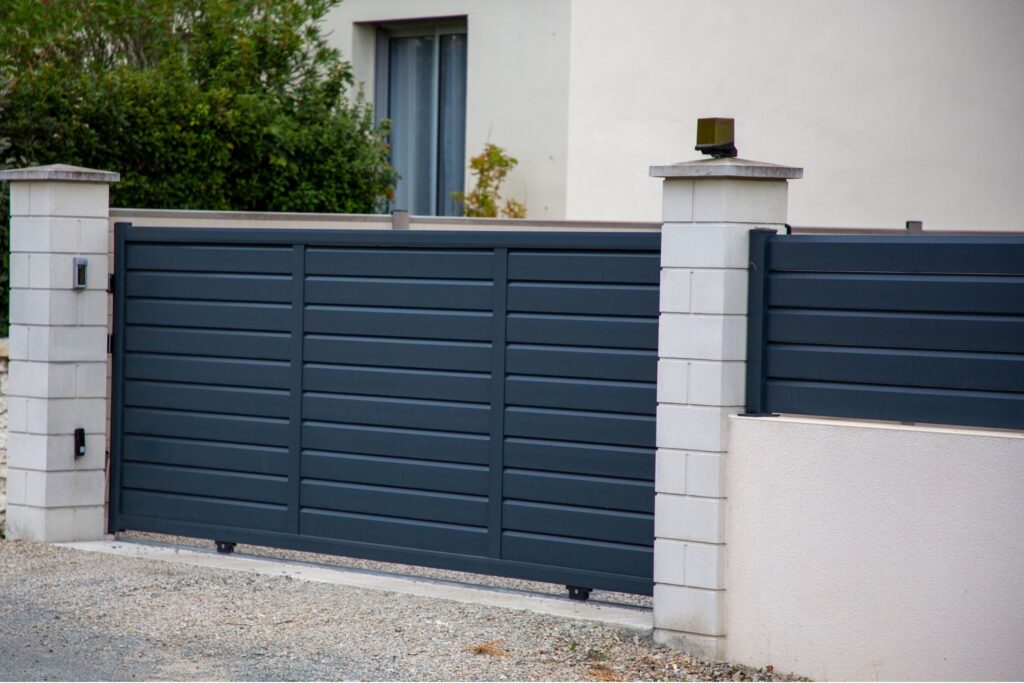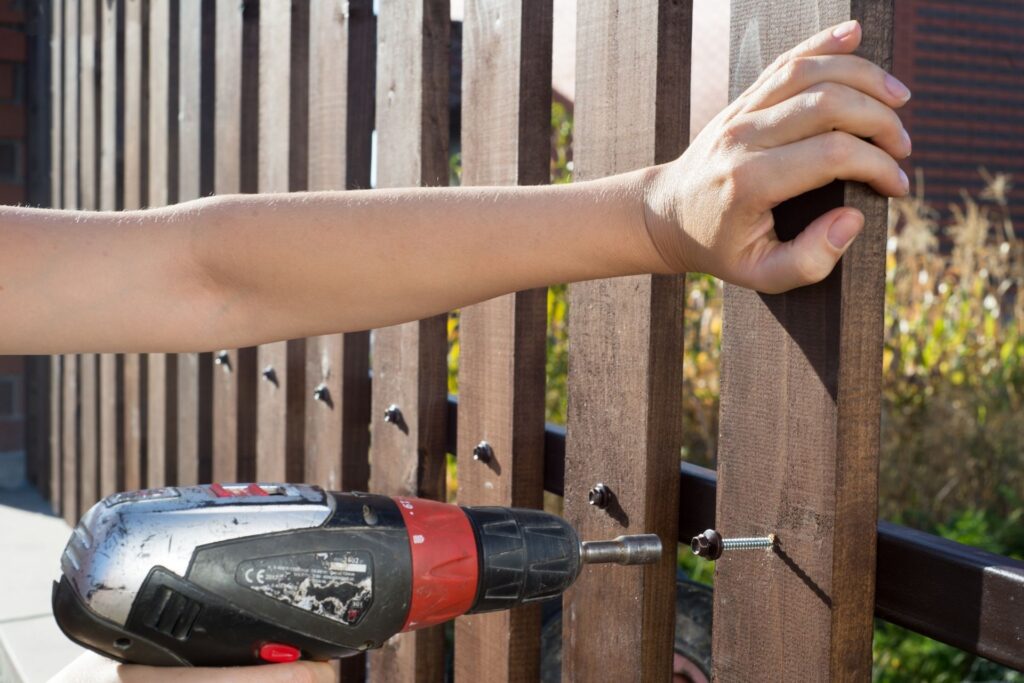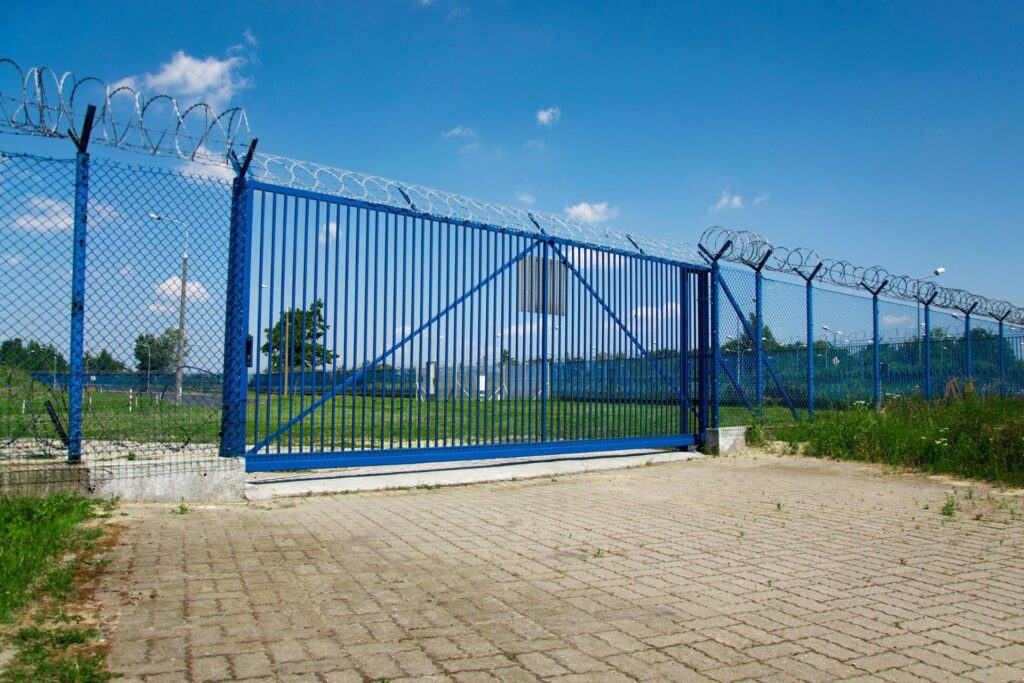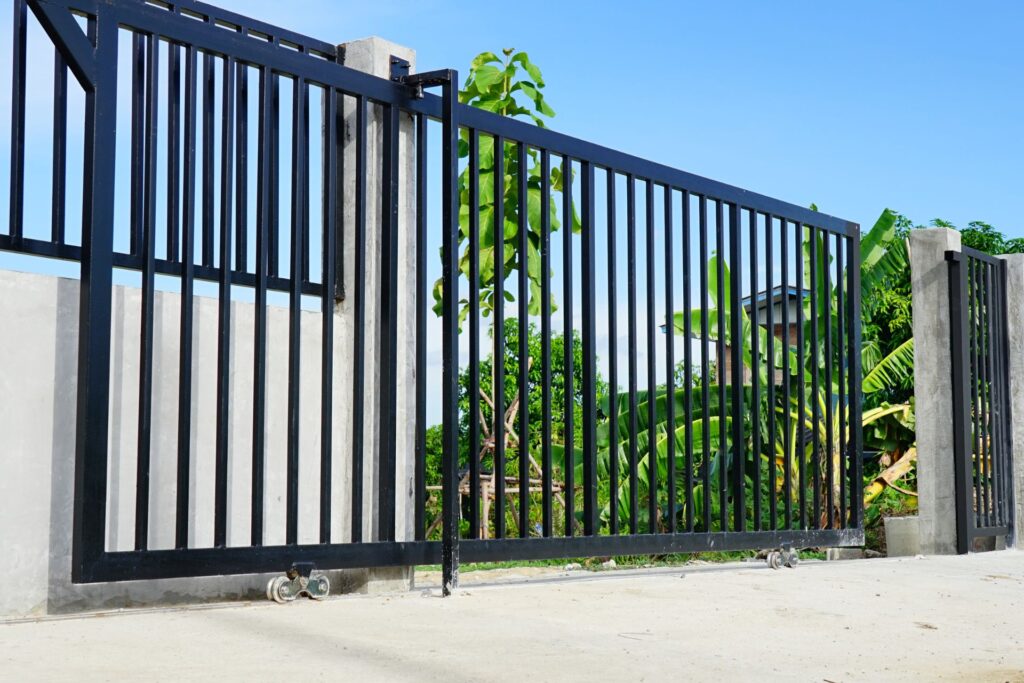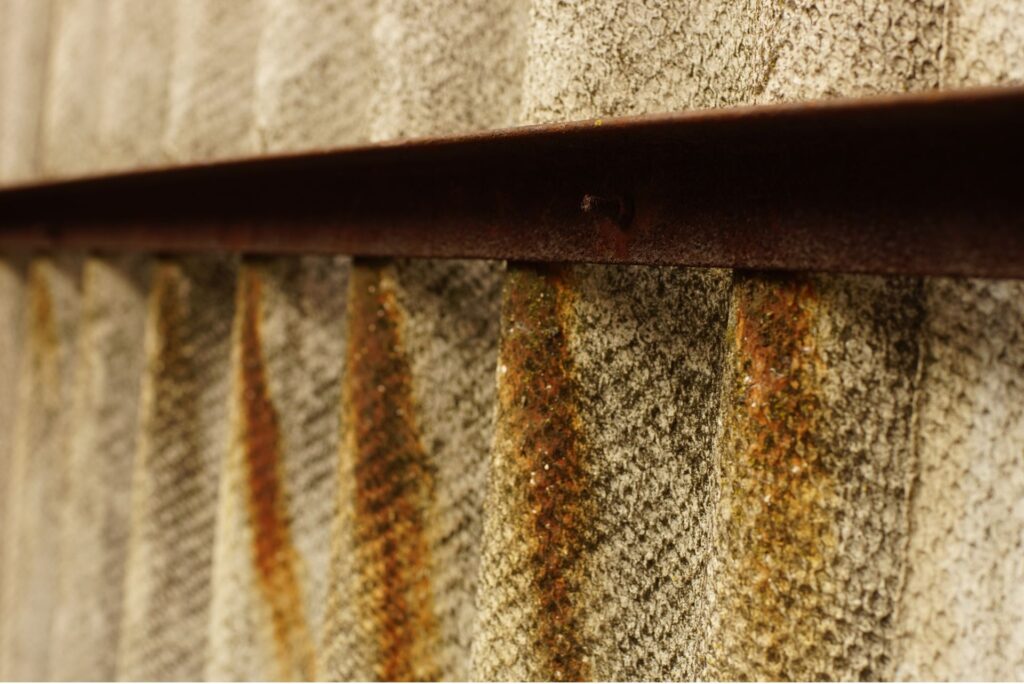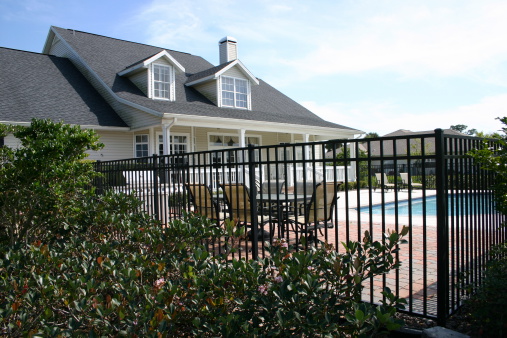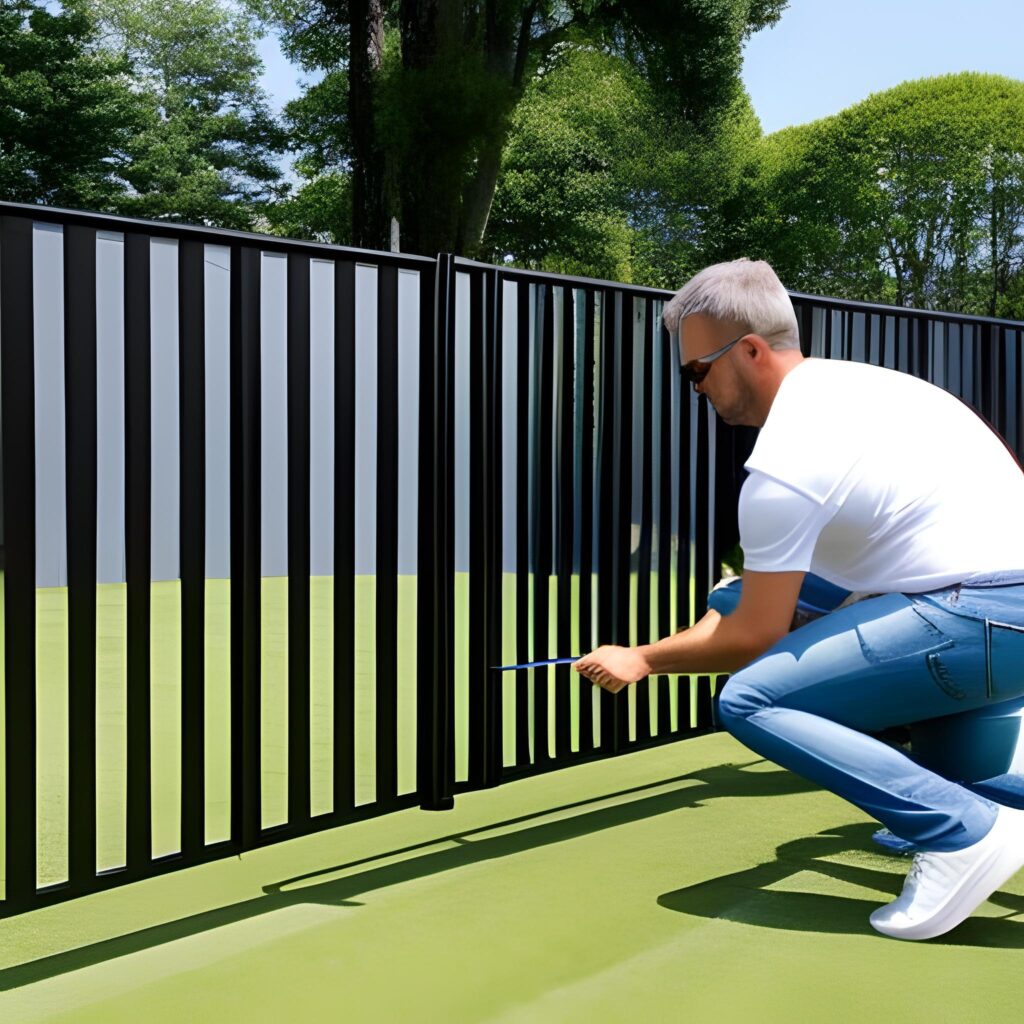Welcome to our comprehensive guide on answering the big question: How much does it cost to install a fence gate? Whether you’re looking to add security, improve your home’s curb appeal, or simply mark your property boundaries, installing a fence gate is a project that comes with various considerations. From material choices like wood, vinyl, and metal to factors like gate size, design, and labor costs, understanding all the elements that influence the final price is crucial. In this guide, we’ll break down everything you need to know to plan your project with confidence and ensure you get the best value for your investment.
The cost to install a fence gate typically ranges from $300 to $1,500 or more, depending on the material, size, and labor involved. Factors like wood, vinyl, or metal materials, custom designs, and automatic openers can drive up costs. On average, homeowners spend around $700 for a standard-sized gate with professional installation.
Table of Contents
Factors That Influence The Cost Of Installing A Fence Gate
When planning to install a fence gate, there are several factors that can influence the overall cost. From the type of material used to the complexity of the design, each element plays a role in determining the final price. Understanding these factors can help homeowners make informed decisions and choose the best option for their needs and budget.
Material Type
The type of material chosen for a fence gate can greatly impact both the cost and the long-term benefits of the installation. Each material comes with its own advantages, maintenance needs, and price range, so it’s essential to consider both upfront costs and future upkeep.
- Wood: Wood is a classic and popular choice for fence gates due to its aesthetic appeal and ability to be customized. It can be stained or painted to match any home style, and offers a natural, timeless look. Prices for wooden gates vary depending on the type of wood used. For example, cedar, which is naturally resistant to rot, tends to be more expensive than pine, which is more affordable but requires regular maintenance to prevent decay. The general price range for wood gates can be anywhere from $100 to $600 or more, depending on the size and wood quality.
- Vinyl: Vinyl gates have become increasingly popular due to their low-maintenance and long-lasting nature. Unlike wood, vinyl doesn’t require staining or painting, and it’s resistant to common issues like rot and pests. While vinyl tends to have a higher upfront cost, it pays off in the long run due to its durability. On average, a vinyl gate can cost between $200 and $800, with prices varying based on the size and style.
- Metal (Aluminum, Wrought Iron): Metal gates, including aluminum and wrought iron, are prized for their sturdiness and security. Aluminum is lighter and more resistant to rust, making it a popular choice for homeowners in humid climates. Wrought iron, on the other hand, offers a traditional, ornate appearance but can be more expensive due to the complexity of the installation and the weight of the material. Metal gates typically range from $300 to $1,500 or more, depending on the material and design intricacies.
- Chain Link: For homeowners looking for a budget-friendly and utilitarian option, chain link gates are often the go-to choice. While they may not provide the same level of aesthetic appeal as wood or metal gates, they are highly functional, particularly for areas that require security or boundary marking. Chain link gates are also easier and quicker to install, which can lower labor costs. The price for a basic chain-link gate can range from $100 to $400, depending on the size and gauge of the wire.
- Composite: Composite gates are a newer option in the fencing industry, combining the look of wood with the durability of vinyl. They are made from a mixture of wood fibers and plastic, making them resistant to weather, pests, and rot. Composite gates require very little maintenance and offer the benefit of being environmentally friendly. In terms of cost, they generally fall between vinyl and wood, with prices ranging from $200 to $1,000 depending on the design and size.
Gate Size and Design
The size and design of a gate are other key factors that affect the total cost of installation. Larger gates and those with more intricate designs will require more materials, labor, and sometimes specialized tools.
- Single vs. Double Gates: One of the first decisions to make when choosing a gate is whether to install a single or double gate. Single gates typically consist of one panel and are easier to install, making them a more cost-effective option. Double gates, which have two panels that open from the center, are often necessary for wider entrances but tend to cost more due to the extra materials and labor involved. Double gates are ideal for driveways or areas that need wider access. The cost for single gates can range from $100 to $500, while double gates may start around $300 and can exceed $1,500, depending on the materials and size.
- Custom Designs: A customized gate can add a unique and personalized touch to a property, but it also increases the overall cost. Custom designs may include intricate patterns, unique shapes, or additional features like privacy screens, decorative elements, or even electronic opening systems. Customization requires more labor and materials, which can drive up the price considerably. Depending on the complexity, a custom-designed gate can cost several hundred to a few thousand dollars more than standard options.
- Standard Sizes: For those looking to keep costs down, opting for a standard-sized gate is a more budget-friendly option. Common gate sizes for residential properties typically include widths of 3 to 6 feet for pedestrian gates and 10 to 12 feet for driveway gates. The average cost for standard-sized gates generally falls within the lower end of the price range, starting around $100 and increasing depending on the material and additional features.
Installation Labor Costs
In addition to the cost of materials, labor is another significant factor when installing a fence gate. Depending on the complexity of the installation and the specific site conditions, labor costs can vary widely.
- Professional Installation: Hiring a professional to install a fence gate ensures that the job is done correctly and efficiently. Professionals have the necessary tools and expertise to ensure the gate functions properly, including leveling the gate and securing posts. While professional installation comes with a higher price tag, it can prevent costly mistakes in the long run. On average, labor costs for installing a gate range from $150 to $1,000 or more, depending on the gate size, material, and location. It’s also important to note that labor costs may vary based on geographic location, with some regions commanding higher rates for skilled labor.
- DIY Installation: For those looking to save on installation costs, taking the DIY route is an option. However, installing a gate is not without its challenges. Proper installation requires attention to detail, particularly when it comes to leveling the gate and securing the posts. DIY installation may lead to potential risks, such as uneven gates, poor alignment, or premature wear and tear. While it can save money upfront, homeowners should carefully consider whether they have the necessary skills and tools to complete the installation.
- Location & Terrain: The specific characteristics of the installation site can also affect labor costs. For example, if the gate needs to be installed on uneven terrain, such as a slope, the process may require additional work to level the ground or clear debris. In these cases, labor costs may increase due to the extra time and effort required. Homeowners should consider obtaining an estimate from a professional if the site presents challenges that could impact the complexity of the installation.
By understanding these key factors—material type, gate size and design, and installation labor costs—homeowners can make more informed decisions and better plan for the overall cost of installing a fence gate.
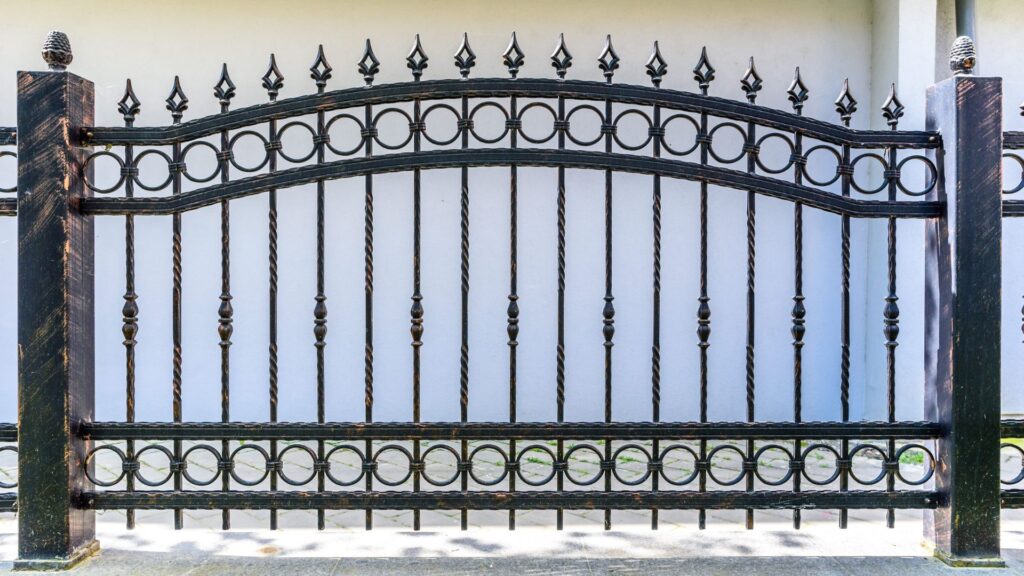
Breakdown Of Installation Costs Based On Material And Type
When it comes to installing a fence gate, the costs can vary significantly based on the material and type of gate you choose. In this guide, we’ll break down the installation costs associated with different types of fence gates, helping you better understand the price structure so you can plan your project more effectively.
Cost of Wood Fence Gate Installation
Material Cost
The cost of a wood fence gate depends on the type of wood used. For instance, cedar typically costs between $15 and $30 per linear foot, while pressure-treated pine is more affordable, ranging from $10 to $20 per linear foot. Exotic hardwoods, like redwood or teak, are at the higher end of the spectrum, costing anywhere from $40 to $70 per linear foot. A standard-sized wood gate (approximately 4 to 6 feet wide) might cost between $100 and $500 in materials, depending on the wood type and any additional features such as decorative elements or hardware.
Labor Cost
Labor costs for installing a wood gate usually range from $50 to $150 per hour, depending on your location and the complexity of the installation. If staining or sealing is required, expect to pay an additional $100 to $200, as this involves both materials and labor. Installation of a basic wooden gate usually takes a few hours, and labor costs can total between $200 and $500.
Total Estimate
A basic wooden gate installation, including both materials and labor, can range from $300 to $1,000. The final price depends largely on the type of wood, the size of the gate, and any extra features or finishes.
Cost of Vinyl Fence Gate Installation
Material Cost
Vinyl is known for its durability and low maintenance, making it a popular choice for fence gates. The cost of vinyl gates varies based on thickness and quality. On average, vinyl can cost between $20 and $40 per linear foot, with a standard vinyl gate (4 to 6 feet wide) costing anywhere from $200 to $600. Premium vinyl, which offers enhanced durability and better aesthetics, may drive up material costs to $40 to $60 per linear foot.
Labor Cost
Professional installation of vinyl fence gates is generally more straightforward than wood or metal, which can help reduce labor costs. Homeowners can expect to pay between $150 and $300 in labor, depending on the complexity of the gate and local labor rates.
Total Estimate
The total cost for installing a vinyl fence gate typically falls between $400 and $900, including both materials and labor. If you opt for premium materials or custom designs, the price could be higher.
Cost of Metal Fence Gate Installation
Material Cost
Metal fence gates come in a variety of materials, with aluminum and wrought iron being the most common. Aluminum gates are more affordable, typically ranging from $30 to $50 per linear foot. Wrought iron, on the other hand, is a premium material, costing between $50 and $100 per linear foot. Additional costs for powder coating or special finishes can add another $100 to $300, depending on the size of the gate and the complexity of the design.
Labor Cost
Metal fence gates often require specialized labor, as welding or custom fabrication may be necessary. Labor costs for installing metal gates are higher than for wood or vinyl, generally ranging from $300 to $600. This increase is due to the specialized skills required and the extra time often involved in working with metal.
Total Estimate
For a basic metal gate installation, including materials and labor, the cost can range from $700 to $2,000. Wrought iron gates, with their intricate designs and custom finishes, are at the higher end of the price range.
Cost of Chain-Link Fence Gate Installation
Material Cost
Chain-link fence gates are among the most affordable options available. The cost of chain-link materials typically ranges from $7 to $15 per linear foot. For a standard-sized chain-link gate, material costs are usually between $100 and $300. This makes it an attractive option for homeowners seeking a durable yet cost-effective solution.
Labor Cost
The installation of a chain-link fence gate is relatively simple compared to wood or metal gates, which means labor costs are lower. On average, labor costs range from $100 to $250, depending on the size of the gate and local labor rates.
Total Estimate
The total cost for a chain-link fence gate installation generally falls between $200 and $550, making it one of the most budget-friendly options for homeowners.
Cost of Composite Fence Gate Installation
Material Cost
Composite materials are gaining popularity due to their eco-friendly nature and durability. Composite gates typically cost between $30 and $50 per linear foot, with a standard gate costing anywhere from $200 to $600. Composite gates can mimic the appearance of wood while being more resistant to weather and pests.
Labor Cost
Because composite gates require specific tools and skills for proper installation, labor costs can be higher than for wood or vinyl. Homeowners can expect to pay between $200 and $400 in labor, depending on the gate’s complexity and local labor rates.
Total Estimate
The total cost for a composite fence gate installation generally ranges from $500 to $1,000, including both materials and labor. While more expensive than vinyl or chain-link, composite gates offer long-term durability and a more premium aesthetic, which can justify the higher price.
When planning for a fence gate installation, it’s important to consider both material and labor costs. Each material type—wood, vinyl, metal, chain-link, and composite—comes with its own price range, which will significantly affect your overall budget. Understanding these costs in detail will help you make a more informed decision, ensuring that you select the right gate for your property, style, and budget.

Additional Costs To Consider
When planning a fence and gate installation, it’s essential to consider all the potential costs that may arise beyond just the materials and labor. Some of these extra expenses are tied to the specific features you want to include in your gate, local regulations, and the ongoing maintenance required for keeping your fence and gate in top condition. Let’s break down the key areas that can impact your overall budget:
Gate Hardware
Locks, Hinges, Latches
The type of hardware you choose for your gate plays a significant role in determining the final cost. Basic latches, which are simple and functional, are generally more affordable but may not offer the security or convenience some homeowners desire. If you opt for advanced locking mechanisms, like keyed entry systems or electronic locks, expect the price to rise. Similarly, higher-quality hinges that ensure smooth gate operation can come with a premium, especially for larger or heavier gates that require more durable hardware.
Automatic Gate Openers
If you’re installing a larger or more complex gate, particularly one made of metal or vinyl, you might want to consider adding an automatic gate opener. These devices provide convenience and enhanced security, allowing you to open and close your gate remotely, but they come at a significant cost. Depending on the type and complexity of the opener (such as solar-powered or electric systems), installation fees and the cost of the unit itself can add up quickly. These systems often require professional installation, further increasing the overall expense.
Decorative Elements
Many homeowners seek to add a touch of elegance or personalization to their gates with decorative elements. Features like finials, ornamental scrollwork, or custom designs can elevate the aesthetic of your gate, but they also come with additional costs. The complexity of the design, as well as the material used for these decorative pieces, will influence the price. While these details can enhance the overall appearance of your fence and gate, they should be factored into your budget from the start.
Permits and Regulations
Local Building Codes
Depending on where you live, you may need to obtain permits before installing a fence or gate. Many municipalities have building codes that dictate the height, location, and type of fence allowed on residential properties. Failing to secure the necessary permits can lead to fines or even the removal of your fence. The cost of obtaining a permit varies by location, but it’s an essential step to ensure your installation complies with local regulations. Be sure to check with your local planning office to avoid unexpected costs down the road.
HOA Guidelines
If your property is located in a community governed by a Homeowners Association (HOA), you might face additional fees or restrictions. HOAs often have strict guidelines regarding the appearance, height, and materials used in fencing and gate installations. Some HOAs may require you to submit plans for approval before construction begins, which could delay the project or increase costs if changes are required. Always review your HOA’s regulations to avoid conflicts or surprise expenses.
Maintenance Costs
Long-Term Upkeep
The material you choose for your fence and gate will influence how much you’ll spend on maintenance over the years. For instance, wood fences and gates are known for their classic look but often require regular staining, painting, or sealing to protect them from the elements. Neglecting this upkeep can lead to rot or warping, necessitating expensive repairs or replacements. In contrast, materials like vinyl and metal are lower maintenance. However, they aren’t maintenance-free—vinyl can crack under certain conditions, and metal may require rust prevention treatments. The level of upkeep required should be a key consideration when selecting your gate and fencing materials.
Potential Repairs
Even with regular maintenance, unexpected repairs may arise over the lifetime of your gate. Common issues include gate sagging, which can happen over time as the weight of the gate pulls on the hinges, or rusting hardware that may need to be replaced. Depending on the severity of the problem, these repairs can add up quickly, so it’s a good idea to plan for potential future expenses in your overall budget. Investing in high-quality materials and hardware upfront can help minimize the likelihood of costly repairs in the future.
By carefully considering all these additional costs—from hardware choices to long-term maintenance—you can better plan your fence and gate installation budget. It’s essential to think beyond the initial price tag and factor in these extra expenses to avoid unexpected surprises down the road. This comprehensive approach will help ensure that your investment remains secure and functional for years to come.

Cost-Saving Tips For Installing A Fence Gate
Installing a fence gate can be a significant investment, but there are several ways to minimize costs without sacrificing quality. Whether you’re taking on the project yourself or hiring a professional, following these tips can help you save money while ensuring you get a durable and aesthetically pleasing gate.
Choose the Right Material for Your Budget
Selecting the right material for your fence gate is crucial to balancing cost, durability, and appearance. While materials like wrought iron or cedar may be more expensive upfront, they often offer greater longevity and aesthetic appeal. However, if you’re working within a tight budget, you might consider more affordable options such as vinyl or treated wood. These materials still provide durability but at a fraction of the cost of high-end options. It’s important to weigh the long-term benefits of materials that require less maintenance or have a longer lifespan, as this can lead to savings over time.
Consider DIY for Simpler Gates
If you’re confident in your handyman skills, installing a fence gate yourself can lead to significant cost savings. Simple gate installations, such as those made from wood or vinyl, can be manageable for homeowners with basic DIY experience. Tackling the project on your own eliminates labor costs, which can often make up a large portion of the total expense. However, be sure to research and ensure you have the proper tools, knowledge, and time to complete the project safely and correctly. For more complex gates, such as those involving automation or more intricate designs, it might be worth investing in professional installation.
Shop Around for Quotes
When hiring a professional to install your fence gate, it’s always a good idea to get multiple quotes. Prices can vary significantly between contractors, so shopping around ensures you’re getting the best deal possible. Request at least three estimates and compare not only the cost but also the materials they plan to use and the timeline they propose. Look at reviews and ask for references to ensure you’re hiring someone with a solid reputation. By doing this, you can avoid paying more than necessary while still securing a high-quality installation.
Buy Materials in Bulk
If you’re installing both a fence and a gate, purchasing materials in bulk can be a great way to save money. Many suppliers offer discounts when you buy larger quantities, so you may be able to reduce the cost per unit for fencing materials. Even if you only need a gate, consider buying additional materials that might be useful for future repairs or home improvement projects. This proactive approach could help you save on future purchases, especially if prices increase.
Maintenance Savings
Another way to save money in the long run is to choose materials that require minimal maintenance. While cheaper materials may seem like the best choice upfront, they often require more upkeep, which can add to your overall expenses over time. For example, untreated wood may need regular staining or sealing to prevent rot, while vinyl or composite materials tend to require far less maintenance. By opting for low-maintenance materials, you’ll reduce the need for repairs or replacements, which can lead to significant savings over the life of your fence gate.
Installing a fence gate doesn’t have to break the bank if you plan wisely and take advantage of cost-saving opportunities. From selecting the right materials to considering DIY installation and shopping around for quotes, there are numerous ways to reduce the overall cost. Additionally, by choosing materials that require less maintenance, you can continue to save money in the long run. With these tips in mind, you can enjoy a beautiful and functional fence gate while staying within your budget.

FAQs: About How Much Does It Cost To Install A Fence Gate
How much does it cost to install a basic fence gate?
The cost to install a basic fence gate can range from $300 to $1,500, depending on factors like material, size, and labor. For example, a simple chain-link gate might be on the lower end, while a custom wooden or metal gate could push the price higher.
What materials are most affordable for a fence gate?
Chain link and wood are typically the most affordable materials for a fence gate. Chain-link gates usually cost between $100 and $400, while a basic wooden gate ranges from $200 to $600. More premium materials like vinyl, composite, or wrought iron can significantly increase costs.
What factors affect the cost of installing a fence gate?
The primary factors that affect the cost include the type of material (wood, vinyl, metal, etc.), the size of the gate, the complexity of the design, and labor costs for professional installation. Additional features such as automatic gate openers or custom finishes can also add to the overall cost.
Can I install a fence gate myself to save money?
Yes, you can install a fence gate yourself if you have the proper tools and some DIY experience. A DIY installation can save you on labor costs, but it may take longer and require more effort. For more complex gates, especially those made of metal or involving automation, it’s often best to hire a professional.
How long does it take to install a fence gate?
Installing a standard fence gate usually takes 2 to 4 hours for a professional, depending on the size and material. However, if the terrain needs to be leveled or there are obstacles in the way, installation time may be extended. DIY projects could take longer, potentially a full day or weekend.
Do I need a permit to install a fence gate?
In some areas, you may need a permit to install a fence or gate, especially if it’s over a certain height or located in a specific area. Homeowners should check local building codes and regulations before starting the installation process. If you’re part of a Homeowners Association (HOA), additional guidelines may apply.
What are the maintenance costs for different types of fence gates?
Maintenance costs vary depending on the material. Wood gates may require regular painting, staining, or sealing to prevent weather damage, while metal gates might need occasional rust-proofing or painting. Vinyl and composite gates generally require less maintenance, but can still need occasional cleaning or minor repairs.
Is an automatic gate opener worth the additional cost?
An automatic gate opener can be a worthwhile investment for convenience and security, especially for larger or heavier gates. The cost for installing an automatic opener can range from $300 to $1,500, depending on the type and features. This option is particularly useful for driveway gates or gates that see frequent use.
How do I choose the right fence gate for my needs?
To choose the right fence gate, consider your primary goals—whether it’s for security, aesthetic appeal, or property boundaries. Think about the material (wood, vinyl, metal), how much maintenance you’re willing to do, the size of the gate, and your budget. A durable, low-maintenance material like vinyl or composite might be best for long-term value, while wood could provide a classic look at a lower upfront cost.
How can I save money on installing a fence gate?
To save money, consider choosing a simpler design, opting for more affordable materials like wood or chain link, and comparing quotes from multiple contractors. If possible, a DIY installation can also reduce costs, though it requires more time and effort. Shopping for materials during sales or in bulk can also help lower expenses.
Conclusion
In conclusion, the cost of installing a fence gate is influenced by several key factors, including the type of material chosen, the size of the gate, labor expenses, and any additional features like automatic openers or custom designs. By understanding these elements, homeowners can better plan and budget for their project. Whether you’re looking to enhance your property’s security, improve its curb appeal, or simply add a functional entrance, it’s important to gather estimates and research your options thoroughly. Remember, investing in the right fence gate not only boosts the beauty and security of your home but also provides long-term value and peace of mind.
About the Author:
Mike Veail is a recognized digital marketing expert with over 6 years of experience in helping tradespeople and small businesses thrive online. A former quantity surveyor, Mike combines deep industry knowledge with hands-on expertise in SEO and Google Ads. His marketing strategies are tailored to the specific needs of the trades sector, helping businesses increase visibility and generate more leads through proven, ethical methods.
Mike has successfully partnered with numerous companies, establishing a track record of delivering measurable results. His work has been featured across various platforms that showcase his expertise in lead generation and online marketing for the trades sector.
Learn more about Mike's experience and services at https://theleadguy.online or follow him on social media:

